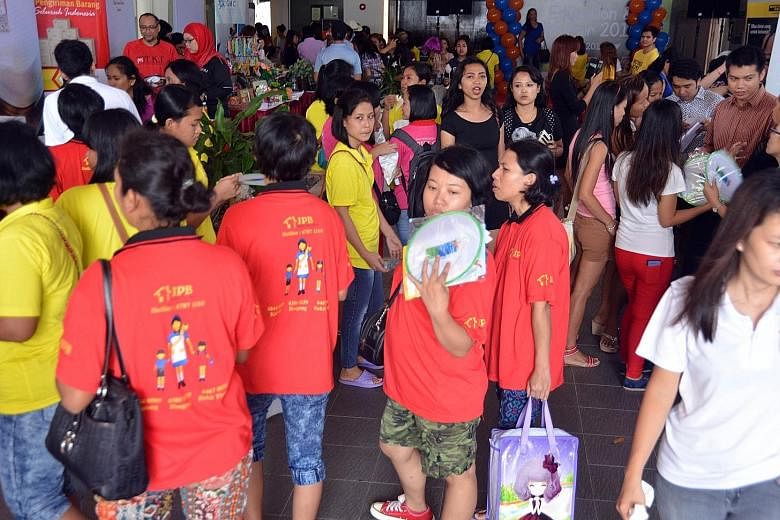A new eldercare course for maids was launched yesterday, adding to the suite of courses available here to train maids to care for their elderly charges.
Launched by the Foreign Domestic Worker Association for Social Support and Training (Fast) in association with training provider Care, the new course was announced by Fast president Seah Seng Choon yesterday at an education and health fair for maids.
Singapore is ageing rapidly, and quality eldercare is an urgent need, said Mr Seah. "It is with this in mind that Fast is launching an initiative to train domestic helpers who have a passion in looking after the elderly to become home-based caregiving specialists," he said.
There are other eldercare courses for maids available, such as those offered by the Agency for Integrated Care. But these are usually just a few days long.
"The Specialist Certificate in Home-based Eldercare programme aims to be more rigorous, and will help participants earn a certificate which they can use to gain employment in other areas back home," said Fast executive director William Chew.
The course being piloted comprises 40 sessions of four hours each, and will take place every Sunday from next month. It costs about $12.50 a class, although Fast members can apply for subsidies.
The training will be conducted by medical professionals trained in gerontology from Care - a recruitment agency that specialises in training caregivers who help the elderly or people with disabilities.
Care managing director Satyaprakash Tiwari said participants will undergo a rigorous programme that will help them learn, among other things, how to dress wounds, feed the elderly and communicate with non-verbal cues, such as eye contact and head nods.
"There may sometimes be a communication barrier if different languages are spoken, and non-verbal communication cues are important to demonstrate that the caregiver is listening," said Mr Tiwari.
Ms Carene Chin, managing director of employment agency Homekeeper, said such courses can help maids gain new skills and increase their competencies, which would benefit the employer.
Indonesian maid Yumiarsih, who goes by one name, believes the course could help her take better care of her employer's 98-year-old father. Said Ms Yumiarsih, who has been working for the same employer for 13 years: "I learnt to care for Ah Gong by myself, but I hope to learn more about other things which I'm sometimes confused about, like how to help him move."
Filipina maid Rizalia Quilicol, 35, hopes to take the course as she is keen on helping the elderly. For the past four months, she has been spending her days off volunteering at the Windsor Nursing Home.
"I want to increase my knowledge and learn more about the elderly, and with a certificate, maybe I can work in a nursing centre next time."
•For more information, call 6262-0868/9150-4488 or e-mail training@carepl.com.sg


